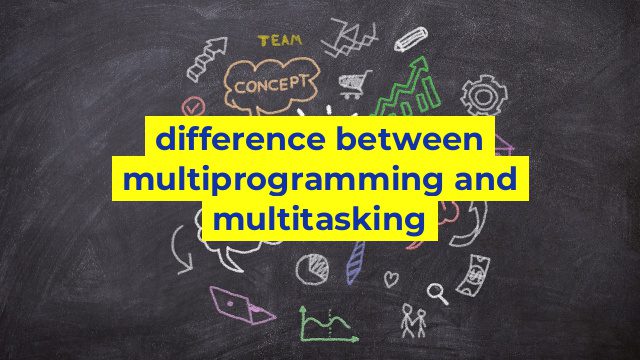Difference between Multiprogramming and Multitasking
When it comes to computer programming, there are a lot of terms that may seem interchangeable. Two of the most common ones are multiprogramming and multitasking. While these terms are related, they describe different concepts. In this article, we’ll delve into the differences between the two.
Multiprogramming
Multiprogramming refers to the ability of a computer to run multiple programs at the same time. However, that doesn’t necessarily mean that the programs are running at the same time. Instead, the computer switches between the programs, giving each program a chance to execute a few instructions before switching to another program.
Multiprogramming is possible because computers have multiple central processing units (CPUs) or cores. Each core can be assigned to a different program, allowing multiple programs to run at the same time. Multiprogramming also allows for better overall computer utilization, since the CPU is always doing something.
Multitasking
Multitasking, on the other hand, refers to the ability of an operating system to run multiple tasks or processes at the same time. In this case, the tasks are truly running at the same time, rather than being switched between. Each task may be part of a different program or part of the same program.
In order for multitasking to work, the operating system needs to divide up the CPU’s time into small slices, often called time quanta. The operating system then allocates these slices to each task, allowing them to run simultaneously. Multitasking allows users to run multiple programs or tasks at the same time, enhancing productivity and overall computer performance.
Key Differences
The key difference between multiprogramming and multitasking is that multiprogramming allows multiple programs to run at the same time, while multitasking allows multiple tasks or processes to run at the same time. Multiprogramming switches between programs, while multitasking divides up the CPU’s time into small slices. Multiprogramming is possible due to multiple CPUs or cores, while multitasking is a function of the operating system.
In conclusion, while multiprogramming and multitasking may seem interchangeable, they are actually quite different concepts. Understanding these differences can help you make better decisions when it comes to computer programming and operating system use.
Table difference between multiprogramming and multitasking
| Multiprogramming | Multitasking | |
|---|---|---|
| Meaning | Running multiple programs on a computer at the same time | Running multiple tasks or threads of a single program on a computer at the same time |
| Resource Utilization | Uses CPU and other resources efficiently by executing multiple programs concurrently | Uses CPU and other resources efficiently by interleaving execution of multiple tasks or threads |
| Memory Management | Memory is divided into partitions and each program is allocated its own partition to execute in | Memory is shared among tasks or threads of a single program |
| Scheduling | Programs are scheduled based on their priority and available resources | Tasks or threads are scheduled based on their priority and available resources |
| Concurrency | Multiple programs are executed truly concurrently | Tasks or threads are executed pseudo-concurrently, as they are interleaved in a time-sliced manner |


